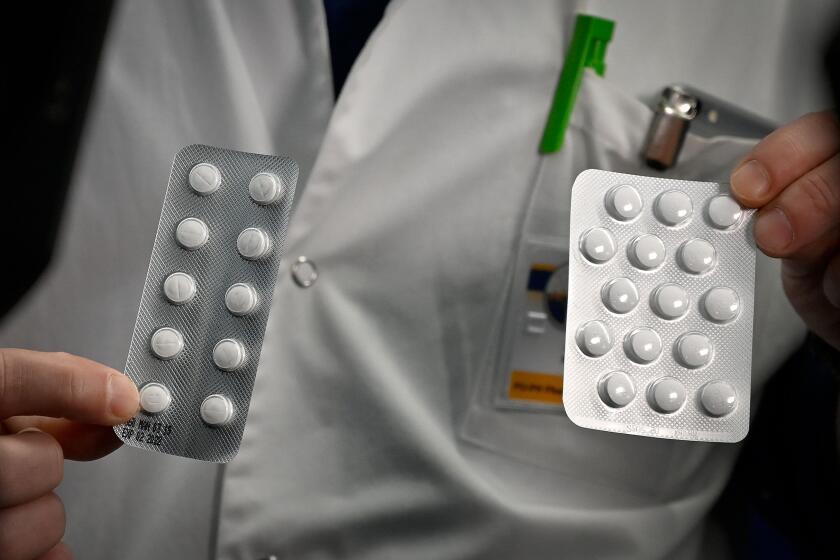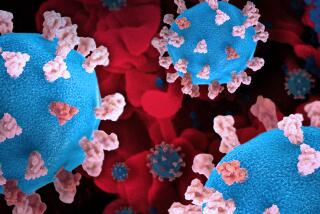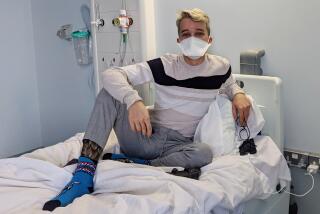How a discovery that brought us Viagra could help those battling the coronavirus

Nitric oxide is a gas with a pretty enviable medical resume.
Its discovery gave rise to a treatment that snatches thousands of “blue babies” — newborns starved of oxygen by a heart defect — from the jaws of death every year. Later, research into the gas’s knack for relaxing blood vessels led to the development of the world’s best-known little blue pill — the erectile dysfunction drug Viagra.
For the record:
10:49 a.m. April 6, 2020A comment at the end of this report about new uses for nitric oxide was originally attributed to Dr. Lorenzo Berra of Massachusetts General Hospital. That statement was made by UCLA pharmacologist Louis J. Ignarro.
In 1992, the journal Science named nitric oxide “molecule of the year.” And in1998, UCLA pharmacologist Louis J. Ignarro shared a Nobel Prize in medicine for uncovering nitric oxide’s role as a “signaling molecule in the cardiovascular system.”
Nitric oxide may not be done yet. The colorless, odorless gas, inhaled through a mask or even from a small “flute,” is now being tested as an experimental treatment for COVID-19. It may also prove helpful in protecting healthcare workers on the front line of the pandemic from getting sick.
At hospitals in Boston, Alabama, Louisiana, Sweden and Austria, researchers have launched a clinical trial to test inhaled nitric oxide in patients with mild to moderate cases of COVID-19. The trial will test whether the gas can drive down the number of patients who end up needing breathing assistance from a mechanical ventilator, a piece of equipment that’s in critically short supply.
For about 30 minutes two or three times a day, study participants assigned to the trial’s active arm will inhale a high dose of nitric oxide through a mask. A control group will go without the gas.
In Italy, where the gas was used under more haphazard conditions, the treatment appeared to dramatically boost oxygen levels in the blood of COVID-19 patients, said Dr. Lorenzo Berra, the critical-care specialist at Massachusetts General Hospital who is leading the new trial. But it’ll take more rigorous testing to clarify how much nitric oxide helps, he said.
A proposed second trial, still under scrutiny by a research panel at Massachusetts General Hospital, would enroll healthcare workers who are routinely exposed to patients with COVID-19 and are themselves at high risk of infection. For 10 to 15 minutes at the start and end of every shift, doctors and nurses would tug on a handheld device and inhale a high dose of nitric oxide.
In humans, nitric oxide is naturally generated by 60 trillion cells that line our blood vessels, and by some brain cells as well. It helps regulate blood pressure, engulfs invading toxins, prevents platelets in the blood from forming clots, and signals that food has arrived and that sex is at hand.
Medicines designed to treat COVID-19 won’t be available for months, so doctors are looking to drugs already approved for treating other diseases.
But sometimes, a supplemental supply is needed.
When inflammation, emphysema or a disease like cystic fibrosis attacks the lungs, the large blood vessels and tiny capillaries that deliver oxygen constrict. Inhaled nitric oxide relaxes those vessels, increasing the transfer of oxygen to the blood and easing the heart’s workload.
Since 1993, it’s been used to rescue oxygen-starved newborns with congenital heart defects, as well as infants with persistent pulmonary hypertension. These young patients begin by breathing a high dose of nitric oxide in their tiny neonatal intensive care bubbles. Their bodies usually respond by making the gas on their own, typically in five days or so.
And that’s it, said Dr. Warren Zapol, a pioneer in the medical uses of nitric oxide and director of Mass General’s Anesthesia Center for Clinical Research. “You turn it on,” he said, and the babies go from blue to pink before your eyes.
In adults with pulmonary hypertension, inhaled nitric oxide dilates the blood vessels of the lungs without affecting blood vessels elsewhere, making it a safe way to relieve high blood pressure. The gas is also administered after heart surgery to prevent the lungs from stiffening.
“It’s a pretty remarkable drug,” Berra said, because its effect, when inhaled, is limited to the lungs. “It has a risk profile that is minimal.”
In 2004, researchers at the University of Leuven in Belgium discovered yet another property of nitric oxide: It killed coronaviruses.
More specifically, it killed the coronavirus that leapt from bats to humans and sparked the 2003 epidemic of severe acute respiratory syndrome, the disease better known as SARS.
In African green monkey cells that had been infected with the SARS coronavirus, an organic nitric oxide compound cut the virus’s ability to replicate in half. A year later, Swedish scientists confirmed the finding and found that the higher the dose, the better the gas worked to shut the SARS virus down.
“The story ended there,” Berra said. The SARS epidemic was quashed in eight months, and “nobody tested anymore.”
How can the new coronavirus affect people so differently — killing some while leaving others blissfully unaware that they have been infected at all?
But Berra didn’t forget that if a new coronavirus ever started targeting people’s lungs, he had a gas on hand that might treat the resulting disease on two fronts — by strengthening the lungs under attack and blocking the virus’ ability to sustain its assault.
This winter, as he watched the new coronavirus known as SARS-CoV-2 spread across the globe, Berra dusted off those studies, talked to the companies that supplied nitric oxide in tanks, and readied his plan.
A total of 240 subjects are expected to enroll in the trial of patients with mild to moderate cases of COVID-19. The follow-on study of healthcare workers aims to include 470 people.
When used at high levels, as is planned in the trials proposed by Berra, the gas will require close monitoring of hemoglobin levels to avert the development of methemoglobinemia, a condition in which red blood cells fail to bond to oxygen. In such cases, Berra said, the dose can be lowered and hemoglobin will quickly revert to normal.
In China, meanwhile, scientists battling the COVID-19 pandemic have focused on a much earlier finding to emerge from Ignarro’s research.
In 1988, researchers found that nitric oxide seemed to play a role in readying the mammalian male for sex. By relaxing the soft tissue of the penis, it allowed blood to flow in and engorge the organ.
Viagra came to the U.S. market eight years later.
Now Viagra is being explored as a treatment for COVID-19. A pilot study in China is testing the drug in COVID-19 patients with breathing troubles who do not yet need mechanical breathing assistance.
Like nitric oxide, Viagra, known generically as sildenafil, dilates blood vessels. The Chinese scientists investigating it believe it may help open the tiny vessels that draw oxygen from the lungs, allowing patients to overcome the respiratory distress that occurs in some cases of COVID-19.
Nitric oxide’s growing list of medical uses continues to delight the pharmacologist who was among the first to explore the gas. Whenever a scientific journal suggests a new beneficial effect, “I’m ecstatic,” Ignarro said. “I go in to my living room — which we call The Nobel Room — and I take out my prize and just appreciate it.”
Then, he added, “I go back to work,” reading and writing manuscripts and updating his textbook, “Nitric Oxide: Biology and Pathobiology,” on the gas’s medical functions.
Life right now is largely online. Here’s how to make the most of it.










